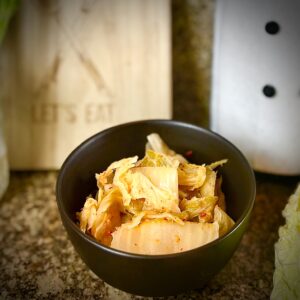
Kimchi
This is a pretty easy kimchi recipe. It mixes quickly tho it does require some patience in the fermenting time.
Equipment
- large mixing bowl
- whisk
- sharp knife
- cutting board
- Measuring spoons
- Measuring cups
- Microplane or fine grater
Ingredients
- 3.5-4 lbs Napa cabbage
- 8 oz diakon
- 1 bunch scallions 5-6
- 8+ large cloves garlic grated
- 1-2 tbsp grated fresh ginger
- 1 tbsp granulated sugar
- 1/3 cup kosher salt
- 1/4 cup fish sauce
- 1+ tbsp gochugaru or other chili flakes
Instructions
- Peel the daikon and set it aside.
- Cut the cabbage in half then quarters and remove the core from the center.
- Cut the quarters of cabbage into 1 1/2 to 2 inch pieces and place in a large mixing bowl.
- Sprinkle all the salt over the cabbage and massage it in well. The cabbage should begin to release some liquid.
- Cover the cabbage with distilled or filtered water and place a plate on top making sure all the cabbage is submerged.
- Allow the cabbage to soak in the brine for 1-2 hours.
- While the cabbage soaks prep the other vegetables.
- Cut the daikon in to planks about 1/8 to 1/4 inch thick and cut the planks into sticks also about 1/8 to 1/4 inch and set aside.
- Cut the scallions into 1 too 1 1/2 inch long pieces and optionally cut those in half lengthwise then set aside.
- Grate the ginger and garlic in a microplane, fine grater, or puree using a food processor.
- Mix together the ginger, garlic, sugar, and fish sauce to form a paste.
- Add in the chili flakes - use as much or as little as you like - I recommend at least 1 tbsp.
- After the cabbage has soaked for at lest 1 and up to 2 hours pour off the brine, rinse in cold water 3-4 times, drain well, and squeeze or press out any excess water.
- In a large mixing bowl add the dressing, cabbage, daikon, and scallions. Mix everything together well gently massaging the dressing into the vegetables. I like to use gloves for this as the mixture may stain your hands and could burn from the chili flakes.
- Once the vegetables are well coated in the dressing and have started to release some liquid pack it into 32 ounce mason jars or other large containers. Be sure to really pack it in, use a clean rubber spatula to press it down.
- Once all the kimchi is in jars add some of the liquid form the bowl to make sure all the vegetables are submerged.
- Cover the jars - I like to put a piece of plastic wrap and then the ring form the canning lid on so that some of the gas can escape a little more easily. If you only have 1 piece lids that is fine you can just put the lid on.
- Place the jars on a plate, tray, or shallow bowl to catch any liquid that may leak out as the kimchi ferments.
- Once a day open the jars and using a clean spoon or rubber spatula press the kimchi down to release any air bubbles and make sure everything is submerged.
- On day 2 you can start tasting the kimchi to see if you like the flavor. When it is to your liking you can put it in the refrigerator. I like to let it ferment at room temperature for at least 5 days but often leave it for 7.
- You can eat it right away or give it a week or two in the fridge first. The longer it sits the better it gets!
Notes
Gochugaru is a Korean chili flake, if you cannot find it you can use regular red chili flakes.